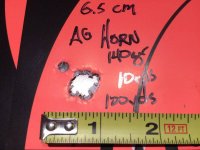Yes and no... Lol ( And I am far from an SME on JB products )
And which JB ? The "Bore Bright" polish ? Or the "Bore Cleaning Compound" ?
To me it depends on exactly how the barrel is nitrided ( read the article ) and how often is someone using JB. / Which one .
( BTW, I use Kroil with the JB Bore Bright polish w/ VFG felt pellets. . )
I mean if you are scrubbing your barrel for an hour, with JB after every shooting session day after day... that might be to much. Lol
So frequency and how much scrubbing every time, might factor into any possible wear.
I use JB Bore Bright Polish on all my rifle barrels, I have yet to personally see a barrel wear out from the JB... but again I don't scrub every barrel every time.
My Criterion Nitrided 6.5CM, and a few other Nitrided Crit. barrels seem to have no ill effects. ( along with other bore types ) and I have fully removed the black coating left from Nitrited bores, with no ill effect.
( Grudgingly, some of the best groups I have fired have been from barrels that had just been cleaned with JB Polish and the Kroil combo and VFG felt cleaning pellets. )
Some people might clean past an OCD level, If the utmost accuracy is their goal, and they clean the crap out of the barrel they might be creating an issue.
Honestly hard to say if JB messes up barrels... there are WAY to many variables to really be able to tell.
So as mentioned, I tend to believe a heavy frequency "might" be to much. ( Never done it though )
Until some one does a big'ol test on JB and bore wear, I am not sure I will ever know if excessively using JB will screw up a bore.
Life is to short for me to worry, I shoot for fun, and am willing to use JB, Kroil and VFG pellets for cleaning when I want.
BTW, 6.5CM Crit. barreled Large Frame I assembled group after "grudgingly" cleaning the bore 10rds , 100yds, benched scoped, blah, blah, blah
Yes I threw the flyer. Got to giddy
Anyway. As for removing the black "free iron"
Read this... the steel is what gets harder. The black finish can be removed safely.
https://www.shootingillustrated.com/content/the-pros-and-cons-of-nitride-barrel-finishes/
Quote ...
"I was surprised to learn from McMillen the only way to remove a properly nitrided treatment is to actually remove the metal. I see a silver appearance throughout when bore-scoping well-seasoned nitrided stainless steel barrels. I thought this was nitride wearing thin, but it turns out the black stuff that comes out on cleaning patches is simply “free iron” resulting from the FNC process. The surface treatment is still fully intact once the black is gone. Proper nitriding will make a chrome-moly barrel’s surface as hard as it can be made. Stainless barrels—which have otherwise been very difficult to toughen up against wear—also become much harder than normal once nitrided."




